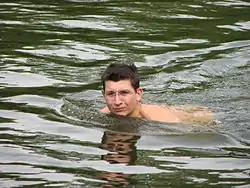peldēt
Latvian

Peldēt (1)
Etymology
From Proto-Baltic *peld-, from Proto-Indo-European *pel- (“to pour, to flow; to swim”) with an extra -d. The meaning, originally “to flow,” evolved into “to be in a (water) stream” and then “to swim.” Cognates include Lithuanian dialectal peldė́ti, Ancient Greek πλάδος (pládos, “moisture”), πλαδορός (pladorós, “humid, watery, soft”), πλαδάω (pladáō, “to be watery, soft”).[1]
Pronunciation
- IPA(key): [pɛ̄ldɛ̂ːt]
Verb
peldēt intr., 3rd conj., pres. peldu, peldi, peld, past peldēju
- (of people, animals) to swim (to move in water by floating and moving one's limbs)
- peldēt uz muguras ― to swim backstroke (lit. on (one's) back)
- peldēt kraulā ― to swim crawl stroke
- peldēt zem ūdens ― to swim under water
- peldēt pa ezeru ― to swim in the lake
- peldēt pa straumi, pret straumi ― to swim with, against the current
- peldēt uz upes otru krastu ― to swim to the other side of the river
- suns labi peld ― the dog swims well
- dīķī peld pīles, gulbji ― ducks, swans swim in the pond
- viņš noskatījās Janča veiklībā, kas gluži kā zivs peldēja gan sāņus, gan guļus, gan augšpēdus ― he watched Jančs' agility, who swam smoothly as a fish, on his side, lying down, and upside down
- zivtiņa peld, līkumus liekdama,... zibinādama savus sudrabainos sānus, strauji vērsdamas ― the little fish swam, turning turns... flashing its silvery sides, quickly turning around
- (of objects; of ships, boats, etc.) to float; to sail (to move in water)
- ezerā peld ledus gabali ― pieces of ice are floating in the lake
- ūdenī peldēja makšķeres pludiņš ― the fishing bobber was floating in the water
- pa upi peld liellaivas ― the barges are sailing on the river
- blakus laivai peldēja samircis priedes mizas gabals ― near the boat, a broken piece of pine tree bark
- laiva peldēja nevis tur, kur es gribēju, uz augšu, saules sudrabā, bet slīdēja pa straumi lēni lejup ― the boat was sailing not where I wanted, upstream, to(ward) the sun's silver; instead, it slid slowly downstream
- to float, to hover (to be in a state of equilibrium in a liquid or in a gas)
- pilnīgi iegrimis peldošs ķermenis parasti vienmēr atrodas stabilā līdzsvarā ― a fully immersed foating body are always in stable equilibrium
- kosmonauts pastāstīja, ka tad, kad iestājies bezsvara stāvoklis, viņš juties ļoti labi... kājas un rokas nekā nesver, priekšmeti peld pa kabīni ― the astronaut said that he felt very well when weightlessness started... (his) legs and feet had no weight, objects floated through the cabin
- to float (to be completely covered by a liquid)
- zupā peld trekni aitas gaļas gabali ― fatty pieces of sheep meat are floating in the soup
- pankūkām pilnīgi jāpeld taukos; tas jācep uz mērenas uguns, lai labi izceptos un neapdegtu ― the pancakes must completely float in the fat; they must be fried on low heat, so that they are well fried and don't burn
- (of clouds, fog, smoke, etc.) to float, to hover (to move slowly in the sky)
- zemu peldēja padebeši ― the clouds were hovering low
- mākonis peldēja debess augstākā vietā, lēni noapaļodams savas robainās malas ― the cloud was floating in the highest place of the sky, slowly smoothing its jagged edge
- iedegās ugunskurs... zilganas dūmu strēles peldēja pāri ievu krūmiem ― the fire started burning... bluish smoke floated, hovered over the street bushes
- (of birds, flying objects, celestial bodies, etc.) to hover, to fly or move slowly in the sky
- divas vārnas nolaižas lejāk un smagi peld sarkanumā virs meža galiem ― two crows flew down and heavily hover in the redness above the tops of the forest trees
- ugunīgi kvēlā vasaras saule peldēja zilajā debesu bezgalībā ― the fiery summer sun was floating in the blue infinity of the sky
- no debesim nesteidzīgā lidojumā peldēja lielas sniega pārslas ― a big snow flake was floating in a leisurely flight (down) from the sky
- (figuratively) to move around, as if swimming
- plašajā druvā gāzelēdamies peldēja divas pļaujmašīnas ― two mowers were floating/swimming, wobbling in the wide cornfield
- viņa mierīgi peld pa trotuarā vidu, pie krūtīm piespiedusi silpureņu nastiņu ― she quietly swam on the sidewalk, pressing her little bunch of pasque flowers to her chest
- beidzot mums kalpone tomēr bija mājā... kundze drūma kā mākonis peldēja pa istabām un paslepus novēroja jauno ― we finally had a maid in the house... the gloomy (old) lady hovered around like a cloud over the rooms and secretely satched the new one (= maid)
- (of objects) to be, to be located (e.g., in the fog, in smoke, in the darkness, as if floating)
- kad atguva apziņu, viss apkārt ap skolas ēku jau peldēja liesmās un gaiss bija kā svelme ― when he regained consciousness, everything around in the school building was swimming in flames and the air was aglow
- kakti jau grima pilnīgā tumsā, tikai ap galdu vēl peldēja trīsošs staru loks ― the corners (of the room) were already immersed in full darkness, only around the table there still floated a trembling circle of light
- (colloquial, of sounds) to keep changing volume unexpectedly, due to a defect in the recording equipment
- skaņa peld ― the sound is floating, fluctuating (= going up and down)
Conjugation
conjugation of peldēt
Derived terms
- prefixed verbs:
- aizpeldēt
- appeldēt
- atpeldēt
- iepeldēt
- izpeldēt
- nopeldēt
- papeldēt
- pārpeldēt
- piepeldēt
- sapeldēt
- uzpeldēt
- other derived terms:
- pelde
- peldētājs, peldētāja
- peldētava
- peldēties
Related terms
- peldu, peldus
References
- Karulis, Konstantīns (1992), “peldēt”, in Latviešu Etimoloģijas Vārdnīca (in Latvian), Rīga: AVOTS, →ISBN
This article is issued from Wiktionary. The text is licensed under Creative Commons - Attribution - Sharealike. Additional terms may apply for the media files.